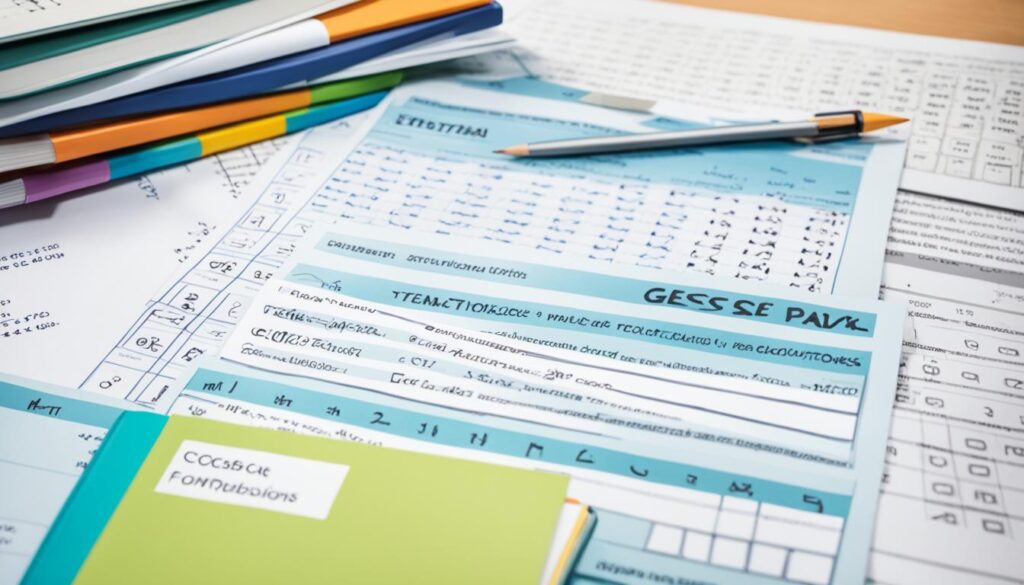As a student, facing GCSE maths exams can feel daunting. The need to do well and get a good grade is huge. It’s especially true for a subject like maths, which is so important.
But, with the right mindset and strategies, you can overcome these challenges. This guide will share the secrets to doing well in GCSE maths. We’ll cover everything from understanding the curriculum to improving your problem-solving skills and revision techniques.
Key Takeaways
- Develop a solid understanding of the GCSE maths curriculum and key topics
- Master the fundamental concepts, such as arithmetic operations and algebraic principles
- Practise regularly with a variety of practice questions and mock tests
- Utilise available resources, including textbooks, online courses, and tutoring services
- Cultivate effective problem-solving techniques and revision strategies
- Manage your time efficiently and familiarise yourself with exam techniques
- Seek additional support from teachers, tutors, and study groups when needed
Understand the GCSE Maths Curriculum
To ace GCSE Maths, start by understanding the curriculum. It includes topics like number and algebra, geometry and measures, and statistics and probability. Each topic has subtopics you should know. Look at your exam board’s curriculum specs to learn about the main gcse maths curriculum topics and their topic weightage in the exam.
Key Topics and Concepts
The gcse maths curriculum covers a wide range of maths maths concepts. These include:
- Number operations, including fractions, decimals, and percentages
- Algebra, such as equations, inequalities, and graphs
- Geometry and measures, including shapes, angles, and trigonometry
- Statistics and probability, including data analysis and probability calculations
Weightage of Topics
The topic weightage in GCSE Maths exams can differ by exam board. But usually, the gcse maths curriculum topics are split like this:
| Topic | Approximate Weightage |
|---|---|
| Number and Algebra | 50% |
| Geometry and Measures | 30% |
| Statistics and Probability | 20% |
Knowing the main curriculum topics and their topic weightage helps you plan your study. This ensures you’re well-prepared for the exam.
Master the Foundations
Getting a solid foundation is key to doing well in GCSE Maths. By getting good at arithmetic operations, algebraic concepts, and geometric principles, you’ll be ready for harder maths. Regularly going over and practising these basic skills will boost your confidence. It will also give you the tools you need to do well in your GCSE Maths exams.
Arithmetic Operations
Being good at basic maths like adding, subtracting, multiplying, and dividing is crucial for GCSE Maths. Make sure you’re comfortable with these skills by doing lots of number exercises, including with fractions. Knowing the order of operations (PEMDAS) and the basics of numbers, like factors and prime numbers, will also help.
Algebraic Concepts
Algebra is a big part of GCSE Maths. Get to know how to work with algebraic expressions, solve linear equations, and use variables and exponents. Understanding things like factorising, expanding, and using formulae will be really useful as you tackle harder maths problems.
Geometric Principles
Geometry is important in GCSE Maths, covering shapes, angles, and how they fit together. Make sure you know the basics of two-dimensional and three-dimensional shapes, how to use Pythagoras’ theorem, and how to find perimeter, area, and volume. Getting these geometric skills right will help you with questions about shapes and space.
| Concept | Key Skills |
|---|---|
| Arithmetic Operations |
|
| Algebraic Concepts |
|
| Geometric Principles |
|
Mastering these key areas will give you a strong maths foundation. Regular revision and practice will build your confidence. It will also make sure you have the basics to do well in your GCSE Maths exams.
gcse maths: Practice Regularly
Success in GCSE Maths comes from regular practice. Solving different types of questions helps you learn how to solve problems, find what you need to work on, and feel more confident.
Instead of long, random study sessions, try short, focused routines. This way, you stay interested, remember things better, and learn the important stuff step by step.
Here are some tips to make gcse maths practice a regular part of your study routine:
- Make sure to set aside time each day or week for practice, even if it’s just 30 minutes.
- Change up the questions you solve to cover a variety of problem-solving situations and topics.
- Practice under the clock to get used to the exam preparation feel.
- Look over your work, find mistakes, and make sure you understand the concepts.
- Ask teachers or tutors for feedback to see where you need to focus more.
Regular, structured practice is the secret to doing your best in GCSE Maths. Stick with it, and you’ll see your hard work pay off.
“Practice is the hardest part of learning, and training is the essence of transformation.” – Ann Voskamp
| Practice Technique | Benefits |
|---|---|
| Textbook Exercises | Reinforce core concepts and build fundamental skills |
| Past Paper Practice | Familiarise with exam format and timing, identify weaknesses |
| Online Practice Platforms | Personalised feedback, adaptive learning, and progress tracking |
Utilise Available Resources
When it comes to GCSE maths, the right resources can really help you do well. You can use textbooks, online courses, and tutoring services to support your learning. These tools are there to help you on your journey.
Textbooks
Textbooks are key for GCSE maths. They cover the curriculum in detail. Choose textbooks that match the latest exam specs. They should have clear explanations, practice questions, and solutions.
Using textbooks can help you understand important topics well.
Online Courses
Online courses are great for learning GCSE maths today. They offer video tutorials, simulations, and feedback. This lets you learn at your pace and go back to tricky areas.
Look for online courses that fit your learning style and needs.
Tutoring Services
Tutoring services give you focused support and attention. An experienced tutor can help you improve in specific areas. They offer valuable insights, feedback, and practice to boost your GCSE maths skills.
| Resource | Benefits | Considerations |
|---|---|---|
| Textbooks |
|
|
| Online Courses |
|
|
| Tutoring Services |
|
|
Using a mix of gcse maths resources can make your learning well-rounded. Textbooks, online courses, and tutoring services can help you learn in ways that suit you. This combination can build a strong GCSE maths foundation and increase your chances of doing well.
“The key to success in GCSE maths is not just about memorising formulas, but rather developing a deep understanding of the underlying concepts. Utilise a variety of resources to engage with the material in a meaningful way.”
Develop Problem-Solving Techniques
GCSE Maths exams often have worded problems that need you to think deeply and use your knowledge. It’s key to learn problem-solving techniques to do well in your exams.
One important strategy is to break down complex problems into manageable steps. This makes it easier to understand and solve each part of the problem. It helps you find the important info and make a clear plan.
Also, recognising patterns and using logical reasoning can boost your problem-solving skills. By spotting common themes or structures in questions, you get better at understanding and applying concepts.
To get better at exam skills and analytical thinking, practice often with different gcse maths problem-solving questions. This boosts your confidence and helps you find and fix any knowledge gaps.
“The key to successful problem-solving is breaking down the problem, recognizing patterns, and applying logical reasoning.”
GCSE maths problem-solving is more than just memorising formulas. It’s about really understanding the maths concepts and using them in real-life situations.
By getting good at these techniques, you’ll do well in your GCSE Maths exams. You’ll also improve your exam skills and analytical thinking, which will help you in the future.
Effective Revision Strategies
Revising GCSE maths well is crucial for success. By revising systematically, you can deepen your understanding and improve your exam performance. Let’s look at some effective strategies to make your revision more productive and impactful.
Summarising Key Concepts
Summarising key concepts is a great way to revise for GCSE maths. Write down the main ideas and formulas in brief notes or use flashcards. This makes it easier to remember and use them in exams. It also helps you understand the basics better, preparing you for different maths problems.
Past Paper Practice
Practising past exam papers is vital for GCSE maths revision. It gets you used to the exam layout and question types. It also shows where you’re strong and where you need to work harder. Try doing past papers under the clock to get used to the exam feel, then go over your answers to see what you need to focus on.
Using both summarising and past paper practice can help you master GCSE maths. It builds a strong foundation and gives you the confidence to do well in exams. Remember, regular and focused revision is key to your GCSE maths success.
“Revising for GCSE maths is not just about memorising formulas, it’s about developing a deep understanding of the subject. The more you practice and summarise the key concepts, the better you’ll be equipped to tackle even the most challenging problems.”
| Revision Strategy | Benefits |
|---|---|
| Summarising Key Concepts | Reinforces understanding, improves recall, and ensures you’re well-prepared for a variety of maths problems. |
| Past Paper Practice | Familiarises you with the exam format, identifies strengths and weaknesses, and boosts confidence in tackling maths problems under timed conditions. |
Time Management and Exam Techniques
Learning how to manage your time and use exam techniques can really boost your GCSE Maths score. By reading questions carefully, planning your time well, and having strategies for different questions, you can do your best.
Master Time Management
Time management is key in GCSE Maths exams. Here are some tips to help you:
- Allocate time wisely: Spend more time on questions worth more marks and manage your time well across the paper.
- Pace yourself: Don’t rush through the exam to avoid mistakes. Keep a steady pace to finish on time.
- Flag tricky questions: If you’re unsure, mark it and come back later. Don’t waste time on questions you’re struggling with.
Develop Effective Exam Techniques
Improving your exam techniques can really help your GCSE Maths score. Try these strategies:
- Read questions carefully: Make sure you know what the question asks before you start solving it.
- Show your working: Show how you got your answer, even if it’s not right. You might get some marks for your effort.
- Review your answers: If you have time, check your work again to spot any mistakes.
Using good time management and exam techniques will give you confidence in your GCSE Maths exam. This can help you do your best.
| Technique | Description |
|---|---|
| Time Management | Manage your time well, pace yourself, and mark tricky questions to improve your exam score. |
| Exam Techniques | Read questions carefully, show your workings, and check your answers to avoid mistakes. |
Mastering time management and exam techniques is the key to unlocking your full potential in GCSE Maths.
Seeking Additional Support
GCSE Maths can be tough, but you don’t have to face it alone. If you’re finding some topics hard, don’t hesitate to ask for help. You can talk to your teachers or think about getting a private tutor to assist you.
Teachers and Tutors
Your teachers are key to getting help with GCSE maths support. They know the curriculum well and can give you focused help. Always feel free to ask questions, go to extra sessions, or ask for one-on-one help.
For more personal help, consider a GCSE maths tutor. A good tutor will adjust their teaching to fit your needs. They can help you understand key concepts better and improve your problem-solving skills. Plus, they can give you tips and practice to get you ready for exams.
Study Groups
Working together can really help with GCSE maths. Being in a study group with friends can be great. You can share notes, talk about tricky topics, and learn from each other’s strengths.
Joining a study group can also make you think more critically and understand maths better. Remember, asking for help shows you’re proactive and serious about doing well. With the right support and resources, you can overcome any maths challenge.
Create a Study Schedule
Creating a structured gcse maths study schedule is key for managing your GCSE Maths prep. Plan your study sessions ahead, setting aside time for each topic based on its importance and your grasp of it. Make sure to balance your study with regular breaks and exercise to stay focused and avoid burnout.
A detailed revision plan can boost your time management skills and ensure you cover all topics systematically. Here are some tips for making an effective study schedule:
- Prioritise topics: Focus on the most critical GCSE Maths topics and concepts. Spend more time on these to build a solid base.
- Establish a routine: Choose a regular study time each day, whether it’s morning, afternoon, or night. Stick to it to develop a habit and keep up your progress.
- Balance your workload: Spread your study time across all GCSE Maths topics to avoid missing any. This approach helps you understand the subject fully.
- Take breaks: Make sure to take regular breaks to avoid burnout and keep your focus sharp. Use these breaks for physical activity to boost your brain power.
- Review and adjust: Keep an eye on your progress and tweak your study plan as needed. If a topic is tough, give it more time or get extra help.
With a thorough gcse maths study schedule, you’ll manage your time well, stay on top of things, and increase your chances of doing well in your GCSE Maths exams.
“Proper planning and preparation prevents poor performance.” – Anonymous
Conclusion
Mastering GCSE Maths takes dedication, strategic planning, and the right techniques. Understanding the curriculum and building a strong foundation are key. Regular practice and using resources can help you reach your full potential.
Using effective revision and exam strategies can boost your chances of doing well in GCSE Maths exams. Summarising key concepts and practising past papers are good ways to improve. Don’t forget to stay motivated and get help from teachers and study groups when you need it. Keep a balance between studying and other activities during your GCSE Maths journey.
With the right mindset and strategies, you’re on your way to mastering GCSE Maths and achieving your goals. Keep going, and remember that being consistent and dedicated are the keys to success in GCSE Maths.
FAQ
What is the GCSE Maths curriculum?
How can I master the foundations of GCSE Maths?
How important is regular practice for GCSE Maths?
What resources are available to support my GCSE Maths learning?
How can I develop effective problem-solving techniques for GCSE Maths?
What are some effective revision strategies for GCSE Maths?
How can I improve my time management and exam techniques for GCSE Maths?
Where can I seek additional support for GCSE Maths?
How can I create an effective study schedule for GCSE Maths?
Source Links
- https://b28mathstutor.co.uk/how-to-revise-gcse-maths-12-tips/ – How to revise GCSE Maths: 12 tips to help you succeed | B28 Maths Tutor
- https://www.gcseonlinecourses.co.uk/post/mastering-gcse-maths – Mastering GCSE Maths: Essential Tips and Strategies for Exam Success
- https://www.linkedin.com/pulse/master-gcse-maths-9-tips-understanding-even-trickiest-work-writers-0flqe – Master GCSE Maths – 9 Tips to Understanding Even the Trickiest Topics





